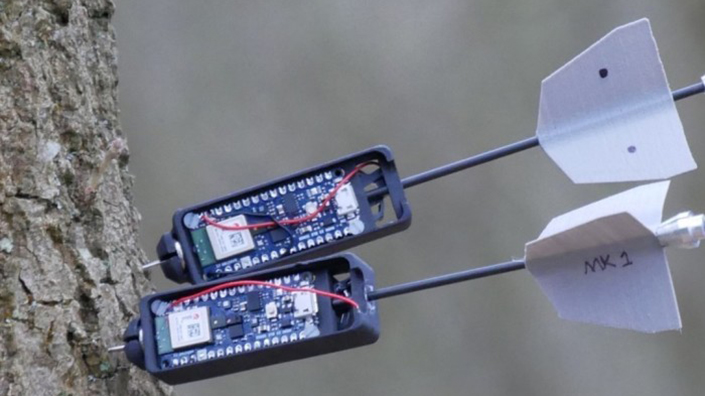Engineering news
Designed to work in cluttered forest environments, the darts can monitor environmental and ecological changes. The drones, developed in the Imperial Aerial Robotics Laboratory, can also place sensors through contact or by ‘perching’ on tree branches.
Conventional sensors for forest monitoring track changes in temperature, humidity and light, as well as the movements of animals and insects. They help to detect and monitor forest fires, and can provide valuable data on climate change and other human activities. Placing sensors can be difficult, however, especially in large, tall forests. Climbing trees to place them poses its own risks.
The Imperial researchers hope the drones, developed as an alternative to the conventional method, will create sensor networks to boost data on forest ecosystems and track hard-to-navigate biomes like the Amazon rainforest.

The darts could form sensor networks throughout forests (Credit: Aerial Robotics Lab, Imperial College London)
Lead researcher Professor Mirko Kovac, director of the Aerial Robotics Lab, said: “Monitoring forest ecosystems can be difficult, but our drones could deploy whole networks of sensors to boost the amount and precision of environmental and ecological data.
“I like to think of them as artificial forest inhabitants who will soon watch over the ecosystem and provide the data we need to protect the environment.”
The drones are equipped with cameras to identify suitable targets. A smart material changes shape when heated to spring-launch the darts, which then stick to the trees. The drones can also perch on tree branches to collect data themselves, acting as mobile sensors.
The researchers tested the drones at the Swiss Federal Laboratories for Materials Science and Technology (Empa) and on trees at Imperial's Silwood Park Campus. They are currently controlled by people – using control units, the researchers watch through the camera to select target trees and shoot the darts. The next step is to make them autonomous, a research announcement said, so the researchers can test how they fare in denser forest environments without human guidance.
Co-author Andre Farinha from the department of aeronautics said: “There are plenty of challenges to be addressed before the drones can be regularly used in forests, like achieving a careful balance between human input and automated tasks so that they can be used safely while remaining adaptable to unpredictable environments.”
Co-author Dr Salua Hamaza from the department of aeronautics said: “We aim to introduce new design and control strategies to allow drones to effectively operate in forested environments. Exploiting smart mechanisms and new sensing techniques we can off-load the on-board computation, and create platforms that are energy-efficient and better performing.”
The work was published in IEEE Robotics and Automation Letters.
Want the best engineering stories delivered straight to your inbox? The Professional Engineering newsletter gives you vital updates on the most cutting-edge engineering and exciting new job opportunities. To sign up, click here.
Content published by Professional Engineering does not necessarily represent the views of the Institution of Mechanical Engineers.